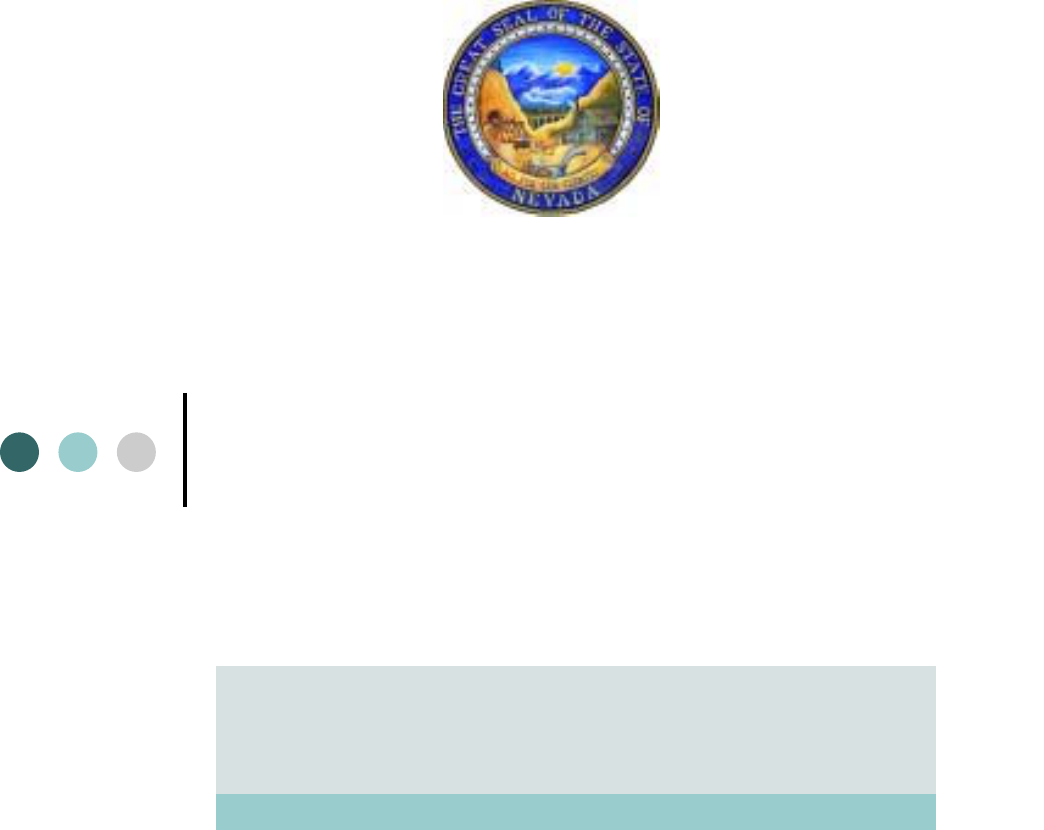
A reference manual published
by the Education Section
DEPARTMENT OF BUSINESS AND INDUSTRY
REAL ESTATE DIVISION
TRUST FUND ACCOUNTING
AND RECORD KEEPING
FOR NEVADA BROKERS
STATE OF NEVADA
Carson City Office
1179 Fairview Drive, Suite E
Carson City, NV 89701-5405
Las Vegas Office
2501 E. Sahara Avenue, Suite 101
Las Vegas, NV 89104-4137
website: www.red.state.nv.us
email: [email protected].us
Rev. March, 2012 All rights reserved. Nevada Real Estate Division
4
th
Edition
Published March, 2012
This publication is made possible through
fees paid by real estate licensees into the
Education, Research and Recovery Fund
TABLE OF CONTENTS
Introduction ................................................................................................................ 1
What Constitutes Trust Funds? ....................................................................... 1
Who Holds Trust Funds? ................................................................................. 2
Written Contract Governs ................................................................................ 2
Broker Has Ownership Interest ....................................................................... 3
Establishing a Trust Account ..................................................................................... 3
Notify the Real Estate Division of Location ................................................... 4
Service Charges ............................................................................................... 4
Interest and Other Economic Benefits ............................................................ 4
Types of Funds and Accounts .................................................................................... 5
Company (Proprietary) Operating Funds ........................................................ 6
Company (Proprietary) Operating Accounts ................................................... 6
Client Funds .................................................................................................... 6
Broker Trust Accounts ..................................................................................... 6
Out of State Brokers ........................................................................................ 7
Custodial Client Accounts ............................................................................... 7
Handling Trust Funds ................................................................................................ 8
Timely Deposits ............................................................................................... 8
Accurate Accounting ....................................................................................... 8
Record Keeping ......................................................................................................... 9
Account Records ............................................................................................. 9
Required Records ............................................................................................ 9
Cash Receipts Journal .......................................................................... 9
Cash Disbursements Journal .............................................................. 10
Client’s Ledger .................................................................................... 10
Account Reconciliation ................................................................................. 10
Embezzlement ............................................................................................... 11
Accounting to Principals ............................................................................... 12
Unclaimed Money .......................................................................................... 12
Commingling and Conversion ................................................................................. 13
Audits and Inspections ............................................................................................. 14
Indexing and Numbering ............................................................................... 15
Inspection(s) and Transactions Files .............................................................. 15
Time Requirement for Record Keeping......................................................... 17
Property Management .............................................................................................. 17
Management Account Records ...................................................................... 18
Management Agreements .............................................................................. 18
Management Files .......................................................................................... 19
Personnel and Income Tax Reports ............................................................... 20
Individual Tenant/Lease Files ........................................................................ 20
Maintenance of Records ................................................................................ 20
Cash Journal ................................................................................................... 21
Owner’s Ledger ............................................................................................. 21
Tenant’s Ledger .............................................................................................. 21
Bank Statements and Checks ......................................................................... 22
Security and Other Tenant Deposits .............................................................. 22
Management Referrals ................................................................................... 23
Closing a Bank Account and/or Broker’s Office ..................................................... 23
Bankruptcy ..................................................................................................... 23
Closing an Office ........................................................................................... 23
Conclusion ................................................................................................................ 24
Appendix
Selected Sections from NRS 645 ................................................................... 25
Selected Sections from NAC 645 .................................................................. 28
Exhibits 1-10

Trust fund Accounting and Record Keeping for Nevada Brokers
Page 1
Trust Fund Accounting and Record Keeping for Brokers
INTRODUCTION
INTRODUCTION
INTRODUCTION
Proper accounting for trust funds and adequate record keeping are basic to the
management of a brokerage office and the legal responsibility of the broker. This
booklet will assist real estate brokers to understand the statutory and regulatory
requirements of Nevada’s license law for the handling of trust funds.
Failure of a real estate broker to manage properly or account for “funds
belonging to others” can result in license revocation whether that failure is one of
ignorance or negligence, whether intentional or unintentional. A broker’s
fiduciary responsibility makes the maintenance of adequate records necessary.
The broker is personally responsible for the supervision and maintenance of the
trust fund accounts and records. Neither delegation of duties, ignorance of daily
brokerage or management activities, nor failure to establish internal control
relieves the broker of the responsibility and potential liability that can result from
a failure to account adequately for money or maintain records.
Inadequate records or failure to maintain control of the trust funds can result in
internal theft, commingling of funds, misuse of trust funds, litigation and/or
disciplinary action. The use of an outside record keeping or accounting service
does not eliminate the need for broker supervision or substitute for the broker’s
fiduciary responsibility.
> WHAT CONSTITUTES TRUST FUNDS?
Provisions of Chapter 645 of Nevada Revised Statutes (NRS 645) and
Chapter 645 of Nevada Administrative Code (NAC 645) set forth the
responsibilities of real estate brokers with regard to record keeping and the
handling of trust funds.
Trust funds are money or things of value that are received by the broker or
salesperson on behalf of a principal, or client, or other person in the performance
of duties for which a real estate license is required, which are not the property of
the broker but are being held for the benefit of others.
Trust funds do not include money relating to any property in which the broker or
his/her personnel have an ownership interest. No matter how small the
percentage of ownership, the intermingling of these funds with those of clients
would constitute commingling. A separate bank account, not a trust account,

Trust fund Accounting and Record Keeping for Nevada Brokers
Page 2
may be established to hold funds for the broker/company owned properties.
> WHO HOLDS TRUST FUNDS?
A broker may hold money or things of value for the benefit of others for many
reasons. For example, earnest money deposits are funds held pending
consummation of a sale transaction. Funds are held as payment of final
settlement costs. In the property management field, a broker may keep security
and maintenance deposits on rental properties, may hold mortgage payments for
a client/principal, or may hold rents collected but not yet disbursed to the
property owner.
The money or things of value may include a check written to a title company or a
mortgage company, a personal note made payable to the seller, title to a motor
vehicle, jewelry or other personal property. The handling and safe keeping of all
of these must be accounted for in a broker’s internal records and to a broker’s
principal.
> WRITTEN CONTRACT GOVERNS
Proper accounting for money in a transaction begins with the written contract
between the seller and buyer, between the lessor/landlord and lessee/tenant, and
the broker and client. The broker must specify in the contract how trust funds are
to be held and where they are to be deposited.
Nevada brokers are not mandated by law to maintain a bank trust account,
however, they must account for all funds. A broker may instead deposit money
directly to escrow, if the contract so specifies. He/she may also pay funds
directly to the seller or landlord in a transaction if all persons having an interest
in the money agree in writing to that arrangement. Under any circumstance, the
broker is personally responsible and liable for the deposit at all times, even if the
funds were delivered directly to the seller or landlord to hold.
When depositing funds directly to an escrow account, the licensee may not
deposit to any escrow company in which he/she or anyone associated with him/
her in the real estate business has an interest unless proper disclosures are made.
A proper disclosure must be made in writing and state the interest the broker, or
member of his/her staff, has in that escrow company. Further, the disclosure
must be acknowledged by the parties to the transaction.

Trust fund Accounting and Record Keeping for Nevada Brokers
Page 3
> BROKER HAS OWNERSHIP INTEREST
In the event that any type of trust funds are received from a cooperating broker or
other third party regarding a property in which the broker/company has an
ownership interest, full disclosure of the interest held must be made and one of
the following procedures should be followed:
1. Place the funds in the cooperating broker’s trust account;
2. Obtain the informed consent from the other principal in the transaction,
thereby permitting the funds to be held by the broker/company acting as a
principal and not held “in trust”; or
3. Deposit the funds with an escrow or title company.
Even though the broker may deposit directly to escrow, without a deposit to the
trust account, he/she must maintain a record of what happened to those funds
while in his/her custody. Minimum documentation for that record is a copy of
the check and a receipt from the escrow agent which must be held in the
transaction file. It is suggested that the Cash Receipts Journal also have a
notation that the funds were received and delivered to escrow rather than
deposited into the broker’s trust account. The client ledger for the transaction
should record the disposition of the funds.
ESTABLISHING A TRUST ACCOUNT
ESTABLISHING A TRUST ACCOUNT
ESTABLISHING A TRUST ACCOUNT
The trust account must be established in a bank in the state of Nevada and clearly
identified as a trust account. The broker must be a trustee for the funds. The
only sole signatories acceptable on a trust account would be a broker or, in the
instance of a property management account, a designated property manager.
Dual signatories on the trust account may be employees of the broker,
salespersons licensed with the broker, or the designated property manager.
Whenever possible, the broker should use an employer’s tax identification
number instead of a personal social security number to establish a trust account.
Branch offices are not required to establish a trust account separate from the
home office trust account. But, if the broker does establish a trust account for the
branch, the branch manager or designated property manager of the branch office
must be a signer on that trust account.

Trust fund Accounting and Record Keeping for Nevada Brokers
Page 4
> NOTIFY THE DIVISION OF LOCATION OF TRUST ACCOUNT
Whenever a broker establishes a trust account, statutes require that he/she notify
the Division of the account number and the name and location of the depository.
Whenever a broker changes a trust account, or the broker’s bank changes name
and/or account number, the new account information must be supplied to the
Division. A form for these notices is available from the Division. The form is
also an authorization for properly identified Division representatives to inspect
the records of this account. NRS 645.310 and NAC 645.655.
A trust account must allow the broker to withdraw money from that account
without prior notice and without penalties for such withdrawals.
> SERVICE CHARGES
Because most financial institutions levy a service charge on a checking account,
the Nevada Real Estate Commission permits a broker to deposit adequate
personal funds to cover this charge. This minimal amount a broker is permitted
to deposit must be accounted for in the journals and ledgers in the same manner
as client funds but should be clearly identified as broker’s funds. Following this
procedure will not be considered commingling by the Division. The maximum
dollar amount of broker funds should not exceed $100.00.
> INTEREST AND OTHER ECONOMIC BENEFITS
Nevada law does not specifically address the establishment of interest-bearing
trust accounts to hold trust funds. Such accounts must be handled with extreme
caution because of prohibitions against commingling, conversion, breach of
fiduciary duty, and practical considerations.
Federal law generally prohibits financial institutions from paying interest on
commercial demand accounts. Interest may be paid on such accounts if the
entire beneficial interest in the account “is held by one or more individuals or by
an organization which is operated primarily for religious, philanthropic,
charitable, educational, political, or similar purposes and which is not operated
for profit”, or on deposits of public funds. See
12 United States Code, Sections
1828, 1832.
On the basis of this provision, several states have enacted legislation which
authorizes the payment of interest on real estate trust accounts to certain non-

Trust fund Accounting and Record Keeping for Nevada Brokers
Page 5
profit charitable organizations. Such authorization is typically limited to client
funds which are nominal in amount or held for a short period of time. Nevada
has not
enacted such legislation.
Since brokers are required to account for and remit client’s money “on demand”,
federal law will preclude the establishment of an interest-bearing trust account in
most situations. A discussion of the limited circumstances in which an interest-
bearing checking account may be established under federal law is beyond the
scope of this booklet.
Assuming one’s ability under federal banking law to establish an interest-bearing
trust account, additional considerations will limit or, as a practical matter,
preclude their use. There must be full disclosure and consent of the parties to the
transaction as to the disposition of any interest earned. This requires an
agreement between the broker and the parties as to who will receive interest and
how it will be remitted to the parties. If the broker is to benefit from any of the
interest earned, that money must be withdrawn from the account and separately
accounted for to prevent commingling. Such an arrangement may result in
income tax liability to the client under assignment of income rules. A tax expert
should therefore be consulted if the broker is to benefit from interest on trust
funds.
Accounting for and payment of interest must be done in accordance with the
broker/client agreement and done in a timely manner.
TYPES OF FUNDS AND ACCOUNTS
TYPES OF FUNDS AND ACCOUNTS
TYPES OF FUNDS AND ACCOUNTS
Any time that a real estate broker handles funds in his/her office there is a need to
identify the nature of the funds. All staff who handle funds in the office should
be adequately trained regarding how to distinguish the nature of the funds.
Funds can be of two types and can be placed in any of three types of bank
accounts.
The two types of funds are company funds and client funds. The three types of
bank accounts are company (proprietary) operating accounts, broker trust
accounts, and custodial client accounts.

Trust fund Accounting and Record Keeping for Nevada Brokers
Page 6
> COMPANY (PROPRIETARY) OPERATING FUNDS
Company funds are received for services rendered, such as brokerage
commissions, lease fees, property management fees, etc. These funds belong to
the company/broker and must always be maintained separately from client funds.
> COMPANY (PROPRIETARY) OPERATING ACCOUNTS
Company operating accounts are established in the name of the broker or
company and should be used to hold only broker or company funds. No client
funds should ever be deposited into these accounts. The bank records should
indicate that the account is owned by the broker or company and the records
should reflect that entity’s federal tax identification number.
> CLIENT FUNDS
Client funds are any funds received that are to be held for the benefit of a client.
Examples of client funds are earnest money deposits, security deposits, rent
receipts from management account tenants, etc. These funds MUST ALWAYS be
kept separate from company funds. Clerical or unlicensed staff may not be aware
of the distinction between the types of funds and so must be properly supervised
by the broker to avoid accidental commingling of company and client funds,
thereby placing the broker’s license in jeopardy.
> BROKER TRUST ACCOUNT
Broker’s trust accounts are established in the name of the company/broker but
must have the words “trust account” on the bank statement and on the printed
checks. The bank must clearly understand that funds in these accounts do not
belong to the broker’s company or the broker in order to eliminate the possibility
of attachment in the case of a judgment, IRS action, or other liability which may
arise to the company or broker. These accounts are used to hold client funds
only.

Trust fund Accounting and Record Keeping for Nevada Brokers
Page 7
> OUT OF STATE BROKERS
A broker licensed in another state and performing brokerage functions in the state
of Nevada under a Cooperative Broker Agreement will look to the cooperating
Nevada broker for an accounting of all money. Any money received in the
transaction shall be handled only by the Nevada broker.
> CUSTODIAL CLIENT ACCOUNTS
Custodial client accounts are bank accounts which are opened in the name of a
client and are primarily used for property management accounts. The name and
ownership of the account with the bank should be that of the client and should
show the broker only as the mailing address for statements and communications.
The client, as well as the broker, must be a signer on this type of account. If an
account holds client funds and does not have the client as a signer on the account,
it is by definition a trust account and must be treated as such.
When funds are received for a client for whom the broker is using a custodial
account, the funds are considered “trust funds” until they are actually deposited
into the custodial account at the bank. The broker has the same level of
responsibility for these funds before depositing as for any other trust funds.
Once they are deposited they are considered delivered to the client because the
client has access to the funds by his/her signature. Handling disbursements from
this type of account holds similar fiduciary responsibilities for the broker and
care must always be exercised.
There is some risk for a broker who uses a custodial account rather than a trust
account because the broker does not have exclusive control over the funds. Since
the client may withdraw funds without consent of the broker, the broker may
write checks on the account and discover that the client has withdrawn the funds
necessary to cover the checks, resulting in returned checks on the account. For
this reason brokers are urged to exercise great caution when using a custodial
account.

Trust fund Accounting and Record Keeping for Nevada Brokers
Page 8
HANDLING TRUST FUNDS
HANDLING TRUST FUNDS
HANDLING TRUST FUNDS
Handling client funds or “trust funds” is one of the most important
responsibilities that a real estate broker has. The broker’s attention to detail,
commitment to professionalism, personal and professional integrity, and ethical
conduct are all reflected in how trust funds are handled. Although the actual
processing of the administrative procedures may be delegated to staff or other
licensed broker/salespersons within the firm, the ultimate responsibility always
lies with the broker of record.
> TIMELY DEPOSITS
All trust funds are to be deposited in a timely manner, whether the funds were
received as part of a sale or lease negotiation or as a property management
function. Before the funds are actually deposited into a bank trust account, they
should be adequately secured in a locked cash box, locked filing cabinet, or other
secure location from where they are not likely to “disappear”. A broker should
have a clear office policy regarding the care of the trust funds from the time they
are received to the time they reach the bank. This policy should be carefully
monitored within the office.
Unless specifically stipulated otherwise in the written contract between the
parties to a transaction, a licensee who receives any type of trust funds on behalf
of a broker shall pay over those funds to that broker, or to the escrow company
designated in the contract, within one business day after receiving those funds.
NAC 645.657. When an offer to purchase ripens into a contract, or when the
broker receives funds related to a property management account, the broker
should deposit the trust funds into the broker’s trust account or deliver the funds
to the authorized escrow agent before the end of the next banking day. Holding
the trust funds beyond these deadlines is a violation of NRS 645 and NAC 645.
> ACCURATE ACCOUNTING
The real estate broker must maintain a sufficient “paper trail” regarding the trust
funds within his/her files so that at any future time a client, an auditor, or other
investigator can reconstruct what happened to the trust funds and when. Copies
of deposit receipts, along with a copy of the check, money order, or even a
photocopy of the cash if payment was made in cash, should be maintained in the
appropriate file. Accurate references on check book registers and trust account

Trust fund Accounting and Record Keeping for Nevada Brokers
Page 9
records regarding the identification of the parties and properties should be
maintained.
RECORD KEEPING
RECORD KEEPING
RECORD KEEPING
> ACCOUNT RECORDS
All trust account checks should be imprinted with sequential numbers and
deposit slips should be printed in duplicate with the name of the real estate
brokerage imprinted on them.
> REQUIRED RECORDS
The minimum records required for a broker’s trust account are:
- Cash receipts journal;
- Cash disbursements journal or an itemized check stub;
- Client ledger or sub-ledgers if using a consolidated trust account;
- Transaction files, numbered or indexed;
- Bank account statements and checks.
The broker must keep a record of all of the money that is received by him/her,
whether for deposit to the trust account, or for deposit directly to escrow. This
record must show:
- The date and amount of money that was received;
- The date and amount of money that was deposited;
- The dates and amounts of all withdrawals;
- Parties for whom the deposit or withdrawal was made;
- To whom the money belongs.
A cash receipts journal is the diary, or daily chronological record, of trust funds
(things of value) received for the benefit of another. This journal is used to
record the date of receipt, the amount of money or value received, and the form
of funds received (i.e., cash, check, note, etc). It also records from whom
received, for whom received, property identification, and transaction file number

Trust fund Accounting and Record Keeping for Nevada Brokers
Page 10
(see exhibit #1).
If the funds were not deposited to the broker’s trust account, the cash receipts
journal should record the location of the funds or assets.
A cash disbursements journal, like the check stubs or check register, is used to
keep track of all disbursements. It must show the date and amount of
disbursement, to whom the money was paid, on whose behalf it was paid, the
transaction file number, and the resulting balance.
Depending upon the bookkeeping used, the cash receipts and cash disbursements
journals may be combined into one journal (exhibit #1). The cash receipts
journal and disbursements journal are maintained for the entire trust account
sequentially. However, these journals do not segregate the transactions by the
various clients whose funds are held in trust. This separate, cumulative record,
for each beneficiary or transaction is the client’s ledger.
The client’s ledger is maintained for each client whose funds are held in the trust
account. When a transaction is entered into the cash receipts journal or the cash
disbursement journal, it is also entered into the individual client ledger. By
recording these transactions chronologically, and immediately, the client’s ledger
will always show the balance in the trust account belonging to the individual
client. These amounts must always match those listed in the journal. The
combined total of the balances of the client ledgers should always equal the
running balance in the trust account check book register and in the cash receipts/
disbursement journals.
The client’s ledger should contain a separate sheet or record for each transaction.
It must name the parties to the transaction, the property address or location, the
amount and dates of deposits, and withdrawals, and balances (see exhibit #2).
Transaction files, their contents and identification, are discussed in the audits and
inspections section.
> ACCOUNT RECONCILIATION - aka KEEPING YOUR BALANCE
The broker’s trust account balance must always equal the trust liability. The
balance of the trust account bank records must equal the balance of the clients’
ledgers. The monthly statements on the bank account must be promptly
reconciled to the check register, the journals, and the client’s ledgers. In the case
of property management and real estate transaction trust accounts, bank

Trust fund Accounting and Record Keeping for Nevada Brokers
Page 11
statements must be reconciled within 30 days after receipt by the broker or his/
her designee. NAC 645.655. A monthly account reconciliation will help discover
math or posting errors before they become problems. Timely and regular account
reconciliations can prevent unpaid commissions from becoming commingled
funds.
When balancing the ledgers, only positive balances may be added. If any ledger
shows a negative balance, there is a problem which needs immediate correction.
This could show a conversion of trust funds. Keep the balance current in the
journals, ledgers, and checkbook. It will be easier to prepare a trial balance at the
end of the month.
> EMBEZZLEMENT
The stated balance on the bank statement should equal the checkbook balance
minus outstanding checks and charges plus outstanding deposits. These should
equal the balance of the clients’ ledgers. Sample forms of the required journals
and ledgers are shown in the exhibits. The examples provided are suggested
forms for the minimum records required. The complexity of business conducted
may demand more sophisticated record keeping.
In spite of the broker’s best efforts and good intentions, it is possible to have an
employee who embezzles. There are some standard procedures that may help
prevent employee theft. Remember, the broker will ultimately be held
responsible to the client and to the Real Estate Division for any shortage in the
account.
Suggested management techniques to prevent embezzlement:
Each month the broker should calculate the dollar value of the trust funds for
which he/she is responsible and then examine the bank account to ensure that
the money is there. This is the sum of the balances of all the client ledgers
and the broker funds deposited to pay bank charges.
An outside accounting firm can prepare an audited financial statement for the
trust accounts.
The broker should personally audit the trust accounts monthly.
The broker should, if possible, separate the bookkeeping responsibilities from
the office responsibilities that require access to the bank accounts.
If possible, receipts and deposits should be handled by a different staff person

Trust fund Accounting and Record Keeping for Nevada Brokers
Page 12
than the one who handles disbursements and payments.
The broker must exercise supervision over all employees and independent
contractors in his/her office.
In addition to the above, an employee fidelity bond will help the broker in
replacement of any missing funds. Persons handling money on behalf of the
broker should be bonded. The broker should exercise caution regarding the kind
of fidelity coverage obtained to be assured that the policy provisions fit his/her
needs.
> ACCOUNTING TO PRINCIPALS
All trust fund deposits that are received by a broker are the personal
responsibility of the broker and must be fully accounted for to the client. This
accounting must be done within a reasonable time. For example, in sales
transactions the complete closing statement must be provided to the client within
ten days after close of the transaction; property management reports are normally
made on a monthly basis.
The information that must be supplied to a broker’s client includes the dates and
amounts of all money received and disbursed, as well as to whom and from
whom the funds were disbursed or received. This information must also include
the purpose of each receipt or disbursement. Accounting to the client must be
done in writing and include invoices and/or disbursements.
> UNCLAIMED MONEY
Rarely, money may be held in a broker’s trust account which belongs to a person
or persons that cannot be located. A sincere effort must be made to locate that
person and such effort should be documented. For example, send written notice
of the money that must be disbursed to the party at the last known address. Send
notice by certified/return receipt mail and include a change of address request. If
the mail is returned, keep the letter intact and filed with the appropriate
transaction file.
If all efforts to locate the owner of the trust money fail, the funds must be turned
over to the Office of the State Treasurer, Unclaimed Property. For further
information contact the Office of the State Treasurer, Unclaimed Property at
(702) 486-4140 or on the Internet at www.nevadatreasurer.com/unclaimed
.

Trust fund Accounting and Record Keeping for Nevada Brokers
Page 13
COMMINGLING AND CONVERSION
COMMINGLING AND CONVERSION
COMMINGLING AND CONVERSION
A primary purpose of having a separate trust account, and for keeping detailed
records of that account, is protection of the client. A broker who commingles
the money or other property of his/her principals with their own, or who
converts the money of others to his/her own use, may be guilty of a
disciplinary violation under NRS 645 and/or a criminal offense.
Commingling can occur in unintentional ways. For example, a broker who
has earned a commission or management fee, but leaves the money in the
trust account instead of transferring the money to the general operating
account, may be guilty of commingling. When commissions or other fees for
brokerage services are earned and payable, they become the broker’s money.
Such fees should be paid to the broker’s general operating account before
disbursement of commissions payable to sales associates. However,
property management referral fees may be paid directly from a trust account
to another brokerage (see property management section). Another example
of commingling would be a broker who operates his/her personal rental
properties through his/her clients’ trust accounts.
Conversion is using money in the trust account for the benefit of anyone
other than the rightful beneficiary. This can occur when the broker
“overdraws” the account balance of a client in order to pay expenses, such as
property repairs, on behalf of another client. Any amount over the balance
belonging to the client whose property is being repaired will belong to another
client. Thus, money belonging to one client is spent on behalf of another
client, conversion occurs.
An example of conversion is shown below:
Checkbook balance $10,050.00
Cash Receipt/Disbursement Journal $10,050.00
Client Ledger
Client ‘A’ $5,000.00
Client ‘B’ $5,500.00
Client ‘C’ $(500.00)
Broker Ledger $50.00
$10,050.00

Trust fund Accounting and Record Keeping for Nevada Brokers
Page 14
In this example, the checkbook balances and the journal balances, but Client “C”
has a negative balance of $500.00, which means that money of another client has
been used to cover an expense of Client “C”, thus conversion has occurred.
Until a check clears the bank on which it was drawn, funds are not considered
deposited. If a broker refunds the earnest money, rent, or security deposit of a
buyer/tenant before that buyer’s/tenant’s check has cleared the bank on which it
was drawn, he/she is using money of one principal to benefit another. If the
check tendered is returned for insufficient funds the broker will be obligated to
make up the shortage in the account. Conversion may have occurred.
If a broker permits any trust account, including any ledger account, to fall into
deficit and remain in deficit for more than 45 consecutive days in a year, he/she
will be subject to discipline (NAC 645.655(9)).
AUDITS AND INSPECTIONS
AUDITS AND INSPECTIONS
AUDITS AND INSPECTIONS
All trust account records and transaction files are subject to audit and inspection
by authorized personnel. When Division personnel request documents and/or
access to inspect office files and money accounts, the broker is obligated to
comply. When obtaining a broker’s license, a form is submitted with the license
application that authorizes Nevada Real Estate Division representatives to inspect
bank records. The office transaction file inspection is authorized by
NAC 645.645.
The actual inspection of office files will include checking the items listed in
NAC 645.670, which are:
the office address
the office sign
the procedure used to deposit money
the trust records
the indexing or numbering system used in filing record
Advertising
the availability of current statutes and regulations in the office
any affiliation with a developer as defined in NRS chapters 119 & 119A
any documentation required by NRS chapters 119, 119A, or the Federal Land
Sales Act

Trust fund Accounting and Record Keeping for Nevada Brokers
Page 15
> INDEXING AND NUMBERING
An index is a guide or reference. It may use letters, numbers, or a combination
of both. Whatever system is used, the purpose is to identify and keep an accurate
count of the transactions that are handled in the office.
The index or numbering system can be as simple as 1-2-3, if the volume of
business allows. However, the system can be considerably more complicated.
The type and volume of business will help determine just how complex the
system needs to be. The Division recommends using separate sequences to
index listing contracts, sales contracts, and property management contracts.
Some systems include coding which details the month and year of the
transaction, the branch office that originated the transaction, as well as the actual
transaction number. For example, 08-01-B-87 indicates transaction number 87
was originated in the branch office in August of 2001. The index L129-01
indicates listing number 129, taken in 2001.
Whatever system is used, it must be sequential. NAC 645.655. It must be
consistent. It must include completed transactions and those that have cancelled.
The Division recommends that the open and closed transactions be filed
separately. The separation of finished and currently operating or pending
transactions will assist in keeping track of the activity in the office.
> INSPECTIONS AND TRANSACTION FILES
Bank records that are examined during an office inspection (NRS 645.195)
include the trust account records of:
- Cash Receipts Journal;
- Cash Disbursements Journal or itemized check stubs;
- Clients’ Ledgers;
- Bank statements.
What must be kept in the transaction files?
Office records or transaction files must include documentation for all actions that
have been taken in order to process and/or complete the performance of the
duties owed by the broker. General guidelines which help determine what must
be kept in the file are:
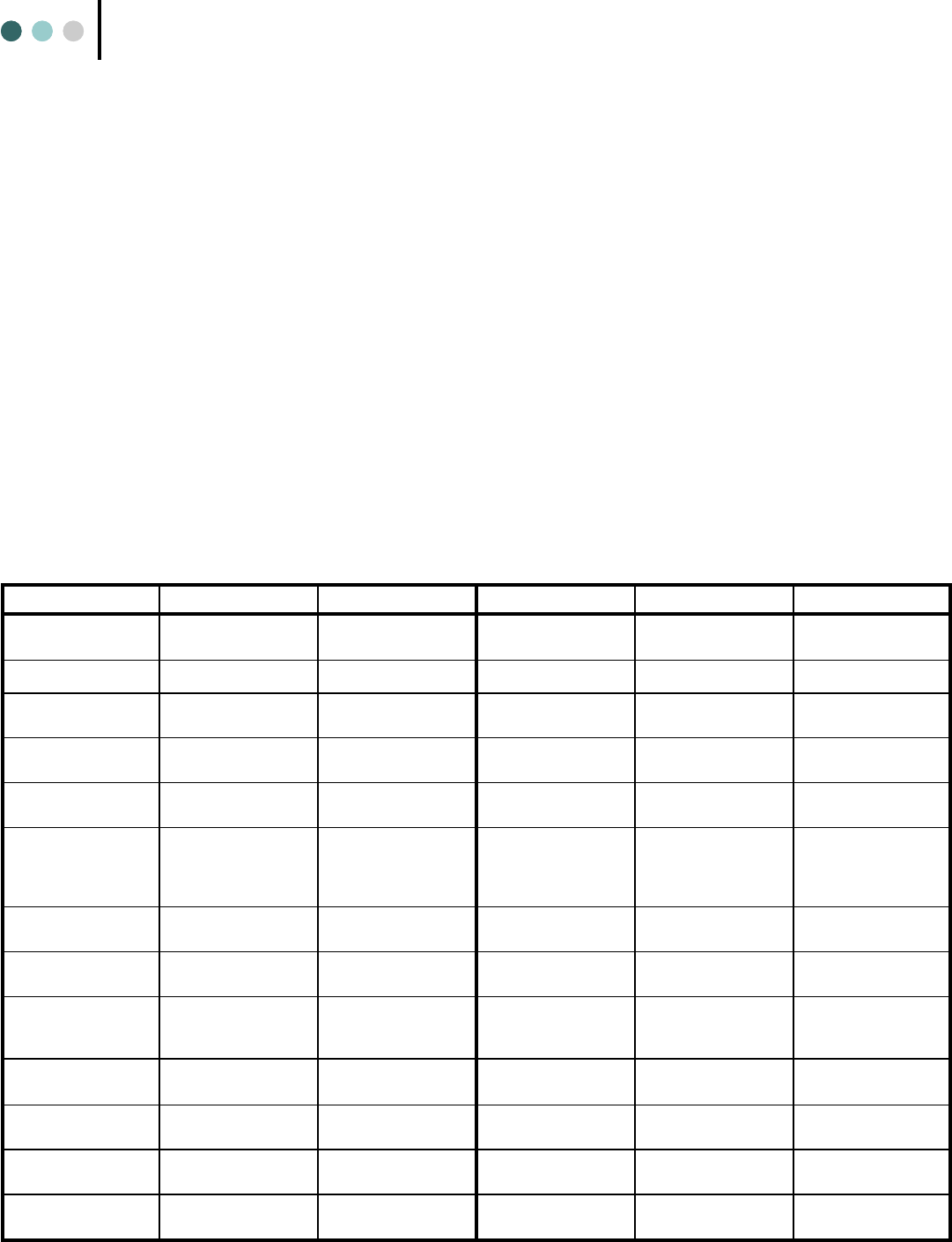
Trust fund Accounting and Record Keeping for Nevada Brokers
Page 16
1. Retain copies of all documents concerning the completion of any sales,
exchanges, options, purchases, rentals, or leases which have been prepared
by the broker or his/her salespersons, or where the client or customer’s
signature is required. Effective January 21, 2000 all offers not accepted
and incomplete transactions must also be retained per NAC 645.650.
2. Retain all documents received that pertain to monetary proration, charge,
or adjustment of items that appear on the closing statement, rental, or lease
agreements, or that affect the fiduciary duties of the broker.
3. Retain any additional documents necessary to show proper performance of
the broker’s duties.
The documents and records listed below provide a guideline regarding the
minimum records to be maintained by the broker. Separate lists are provided for
the transactions conducted by seller’s broker and buyer’s broker:
AGENCY RECORDS SELLER’S BROKER BUYER’S BROKER AGENCY RECORDS SELLER’S BROKER BUYER’S BROKER
Listing agreement Y
ES NO
Loan applications and
lender’s representations
NO NO
Buyer agency agreement N
O YES Escrow instructions YES YES
Duties Owed, Confirma-
tion, Consent to Act
Y
ES YES Preliminary title report SUGGESTED SUGGESTED
Retainer fees paid to
buyer’s broker
N
O YES
Seller Real Property Dis-
closure form (SRPD)
YES YES
Sales agreements and
related documents
Y
ES YES
Common Interest Com-
munities Disclosure (CIC)
YES YES
Amendments, extensions,
and addenda
Y
ES YES
Other Disclosures -
hazards, conditions
required by local or
federal statutes, etc.
YES YES
Earnest money promis-
sory note
C
OPY COPY
Loan application (seller
financing)
YES YES
Earnest money payments
(per contract)
C
OPY COPY Home Protection Plan YES YES
Power of Attorney, Seller Y
ES NO
Agreements to adjust
settlement statements at
closing
YES YES
Power of Attorney, Buyer S
UGGESTED YES
Promissory Note and
Deed of Trust
SUGGESTED SUGGESTED
Installment land contract Y
ES YES
Settlement statements,
buyer/seller
YES YES
Buyer’s credit statement
(seller financing)
O
PTIONAL OPTIONAL Rental/Lease agreement YES YES
Buyer’s financial informa-
tion
N
O NO
Property management
agreement
YES NO

Trust fund Accounting and Record Keeping for Nevada Brokers
Page 17
The broker must keep all original transaction/property files in his/her possession
during and after completion of the transaction. Salespersons must not be
permitted to keep the original files as this weakens, or even destroys, the broker’s
ability to control and supervise the transactions which he/she is responsible for
controlling. It also reduces the broker’s ability to detect and correct problems,
real or potential, during the course of the transaction.
The broker’s possession may include off-site storage. When the retention of
required records takes more space than is available in the office, a storage area in
the building or a rented storage unit outside of the office may be used. When this
happens, the broker must notify the Division of the location of storage. This
notice must be given to the Division before the records are moved. Records must
be accessible during normal business hours (see exhibit #8).
> TIME REQUIREMENT FOR RECORD KEEPING
NAC 645.650 Time requirement for recordkeeping involving real estate
transactions and property management. (NRS 645.190)
1. A broker shall keep complete real estate transaction and property management records for at
least 5 years after the date of the closing or the last activity involving the property, including, without
limitation, offers that were not accepted and transactions that were not completed, unless otherwise
directed by the division.
2. A salesman or broker-salesman must provide any paperwork to the broker with whom he is
associated within 5 calendar days after that paperwork is executed by all the parties. NAC
645.650.
[Real Estate Adv. Comm’n, § VII subsecs. 7 & 10 par. c, eff. 10-31-75]—(NAC A by Real Estate
Comm’n, 8-21-81; A by Real Estate Div., 3-1-96; A by Real Estate Comm’n by R186-99, 1-21-2000;
R031-04, 11-30-2004)
PROPERTY MANAGEMENT
PROPERTY MANAGEMENT
PROPERTY MANAGEMENT
In 1997, Amendments were added to the NRS 645 and NAC 645 relating to
property management activity.
According to NAC 645.655(8), a broker who is engaged in property management
for one or more clients must maintain two (2) separate property management
accounts distinct from any trust account that the broker may have for other real
estate transactions. One trust account must be used solely for rental operating

Trust fund Accounting and Record Keeping for Nevada Brokers
Page 18
activities, and the other trust account must be used solely for security deposits.
NAC 645.8005 specifies that a “designated property manager” must be a broker
or a broker-salesperson with two years of full-time active experience within the
four years immediately preceding the date the person applies for a permit to
engage in property management on behalf of a broker. NAC 645.805 states that
a broker has thirty days to replace a terminated designated property manager or
cease the property management activity. Upon termination of the designated
property manager, a reconciliation of the trust account must be submitted to the
Division to account for the thirty days immediately preceding the date that the
designated property manager ceases to be associated with the broker. This
reconciliation must be submitted no later than fifteen days after the designated
property manager ceases to be connected with the broker.
NAC 645.807 states that a broker may give a broker-salesperson permission to
be a sole signer of checks drawn on a trust account. A signature applied by use
of a rubber stamp does not constitute the signature of a real estate broker-
salesperson for the purposes of this section. NAC 645.807.
> MANAGEMENT ACCOUNT RECORDS
Records for property management accounts must include at least the property
management file containing the management agreement, tax reports, individual
tenant/lease files, cash journal, the chronological record of money received and
disbursed, an Owner’s Ledger, a Tenant’s Ledger, bank statements, and checks.
> MANAGEMENT AGREEMENTS
A written contract for services between the property owner and the
managing broker is required. NRS.645.6056. The agreement must list the
broker’s responsibility and authority, and contain at least the following
items:
1. A description of the subject property and its type, including the number
of units managed;
2. The broker’s duties to be itemized; e.g. collection of rents, holding of
deposits, payment of mortgages, physical maintenance, etc.;
3. Broker’s compensation;

Trust fund Accounting and Record Keeping for Nevada Brokers
Page 19
4. Accounting and reporting requirements;
5. Procedure for repair and payment of repair bills (both emergency and
routine);
6. Effective dates of the agreement with a specific termination date, and if
the agreement is subject to renewal, provisions clearly setting forth the
circumstances under which the agreement may be renewed and the term
of each such renewal;
7. A provision for the retention and disposition of deposits of the tenants
of the property during the term of the agreement and, if the agreement
is subject to renewal, during the term of each such renewal;
8. If the agreement is subject to cancellation by broker and/or client, with
and/or without cause, provisions stating the circumstances under which
the agreement may be cancelled; and
9. Names and signatures of the owner(s)/broker(s)/designated property
manager(s).
> MANAGEMENT FILES
A complete filing system for property management must include the information
and documentation of all transactions and business dealings of the manager,
owner, vendor, and tenant. A very small property may require only one file, but
larger properties will need several file folders to maintain this data. The file(s)
must include at least the following:
1. Property management agreement;
2. Rental/Lease agreement;
3. Duties Owed;
4. Correspondence;
5. Invoices and receipts for repairs, purchases;
6. Monthly owner reports (see exhibit #5); and
7. Other documentation that supports the discharge of the broker’s
obligation, such as insurance information, inspection reports, pictures,
advertising, etc.

Trust fund Accounting and Record Keeping for Nevada Brokers
Page 20
> PERSONNEL AND INCOME TAX REPORTS
Property managers who collect more than $600 per year for a client must provide
that client (unless a corporation) with an Internal Revenue Service (IRS) form
1099 by January 31st of the following year. Property managers who pay more
than $600 per year for services for a client must provide the service provider
(unless a corporation) with an IRS form 1099 by January 31
st
of the following
year. Property managers have to send copies of form 1099 to the IRS by
February 28
th
of that year. These forms are available from the IRS or any office
supply store.
Property managers should keep income and expense records of such detail that
the property owner can rely upon those records when preparing income tax
returns. It is recommended that the broker consult a tax accountant for
competent tax advice.
> INDIVIDUAL TENANT/LEASE FILES
It is recommended that each tenant’s records be maintained in a separate tenant/
lease file. This file should contain the rental agreement, correspondence,
documentation of charges to the tenant, legal actions, etc. When the tenant
vacates, the final security deposit reconciliation should be maintained in this file.
> MAINTENANCE OF RECORDS
The following regulation amplifies the record keeping requirement found at NAC
645.650, regarding property management records:
NAC 645.806 Trust accounts: Annual accounting required; maintenance of
records. (NRS 645.190 & NRS 645.6052)
1. On or before the date of expiration of his license as a real estate broker, a broker who engages
in property management or who associates with a property manager who engages in property
management shall provide to the division, on a form provided by the division, an annual accounting
as required by subsection 5 of NRS 645.310 which shows an annual reconciliation of each trust
account related to property management that he maintains.
2. The reconciliation required pursuant to subsection 1 must include the 30 days immediately
preceding the expiration date of his license as a real estate broker.
3. A broker who engages in property management or who associates with a property manager who

Trust fund Accounting and Record Keeping for Nevada Brokers
Page 21
engages in property management shall maintain complete accounting records of each trust account
related to property management that he maintains for at least five years after the last activity by the
broker which involved the trust account. If the records are maintained by computer, the broker
shall maintain an additional copy of the records on computer disc for at least five years after the
last activity by the broker which involved the trust account.
(Added to NAC by Real Estate Comm’n by R059-98, eff. 7-1-98; A by R092-00, 8-29-2000)
> CASH JOURNAL
The Cash Journal provides a chronological record of all funds received and
disbursed. For cash receipts it must include the date, the account, the name of
the party paying the money, name of the principal, and property identification.
Disbursement records must include the date, the amount, check number, the
payee and property identification.
The Cash Journal should keep a running balance and be reconciled with the bank
statement each month.
> OWNER’S LEDGER
The Owner’s Ledger summarizes all property income and expenses for the
property managed that are handled by the broker. Each property should have its
own ledger and must identify the property or properties for each owner.
This ledger should itemize the source of money received, such as rent or owner
funds, the use of money that is disbursed, and the current balance for this owner.
A broker must account to his/her client on a monthly basis for all money and this
ledger may be used to provide that accounting (see exhibit #3).
> TENANT’S LEDGER
The Tenant’s Ledger must identify the tenant and the property. The purpose of
the ledger is to record the amounts and dates of all charges and payments (i.e.
rent, deposits, damage fee) from a tenant.
This record should be maintained separately for each tenant (see exhibit #4).

Trust fund Accounting and Record Keeping for Nevada Brokers
Page 22
> BANK STATEMENTS AND CHECKS
Bank statements need to be reconciled each month, along with determining the
account trial balance or account liability.
To determine the trust account liability, the account balances of each sub-ledger
(Owner/Tenant’s Ledger) for the account should be listed. There should not be
ledgers with negative balances, as this would indicate conversion of trust funds
from one client’s account to another.
The account liability, the reconciled check register, and the reconciled bank
statement must all show the same balance. If these three balances do not agree,
the broker must locate the error. Errors may be from mathematical inaccuracies,
missing checks, items improperly posted, or commissions not withdrawn.
Whatever the reason, the problem needs to be corrected before it compounds.
If a staff person performs the account reconciliation, the broker must sign the
trust account reconciliation form to document that he/she has reviewed the work.
Every year a reconciliation of the property management trust account is due to
the Division on a form provided by the Division. NAC 645.806 and NRS
645.310. The due date is on or before the broker’s license anniversary month.
Example: Broker’s license renews on June 30
th
, therefore, annual trust account
reconciliation is due every year on or before June 30
th
(see exhibit #9).
Brokers who hold a Property Management Permit, but are not required to file a
Trust Account Reconciliation Form 546 per NAC 645.655(8) because they do not
manage properties, should file Form 546A, Affidavit in Lieu of Form 546,
annually before the end of the anniversary month of their broker’s license.
Brokers with a Property Management Permit are required to file either a Form
546 or Form 546A annually (see exhibit #10).
> SECURITY AND OTHER TENANT DEPOSITS
Security deposits are most commonly held in trust by the broker. They must
be
kept in a separate security deposit trust account per NAC 645.655.
A security deposit may also be held by the property owner. If the security
deposit is transferred to the owner, the tenant and all parties to the transaction
must be notified in writing of the transfer.

Trust fund Accounting and Record Keeping for Nevada Brokers
Page 23
Deposits may be made by the tenant for security, cleaning, damage, pets, etc.
The deposit may be refundable or non-refundable as stated in Rental/Lease
Agreement. When a deposit is received or disbursed it must be accounted for to
the owner and tenant.
A deposit must be listed on the Tenant’s Ledger and must be identified as to its
purpose (i.e. security, damage). The rental or lease agreement should include a
provision authorizing the broker holding the deposit to transfer the deposit to
another owner or manager, or for refund to the tenant. In the event that a transfer
or deposit to another owner or manager does occur, it is also recommended that
the transfer be acknowledged in writing. In addition, the tenant must be notified
of such transfer in writing.
Like all trust funds, deposits must be made to the appropriate trust account by the
next banking day after receipt, unless written agreement of all parties requires
otherwise.
> MANAGEMENT REFERRALS
When paying a property management referral to an outside brokerage, a check
can be issued directly from the broker’s trust account (it does not have to flow
through the broker’s operating account). The outside broker becomes, in
essence, a vendor to the owner.
CLOSING A BANK ACCOUNT AND/OR BROKER’S OFFICE
CLOSING A BANK ACCOUNT AND/OR BROKER’S OFFICE
CLOSING A BANK ACCOUNT AND/OR BROKER’S OFFICE
> BANKRUPTCY
If a broker files for relief under the bankruptcy laws of the United States, the
broker must immediately terminate each trust account that has been established
for the operation of the real estate business. All money deposited to the trust
account must be moved or redeposited to an escrow. The escrow agent must be
given written instructions for disbursement of the funds. Those instructions must
comply with the contract that caused the trust funds to be deposited.
> CLOSING AN OFFICE
When a broker closes his/her office, a few simple steps are required to comply
with Division regulations:

Trust fund Accounting and Record Keeping for Nevada Brokers
Page 24
Broker’s license must be inactivated and surrendered to the Division;
All salesperson and broker-salesperson licensees associated with that broker
must be terminated at the same time and their licenses surrendered to the
Division;
Broker must file a notice with the Division stating the location of the office
records. Location must be within the state of Nevada in a storage facility,
home, office, or other facility. Records must be accessible during normal
business hours. Records must be maintained by the broker for a minimum of
five years (see NAC 645.650 & NAC 645.806); and
Any trust or custodial account monies must be accounted for and properly
disbursed. The accounts must then be closed.
CONCLUSION
CONCLUSION
CONCLUSION
The intent of this booklet is to clarify trust fund deposit and record keeping
requirements for real estate licensees. It is not designed nor intended to cover all
possible situations in the brokerage industry.
In all situations, however, the broker remains responsible and liable for money or
other things of value entrusted to him/her. Careful supervision of employees and
licensees who handle money is essential. Often, standardized office procedures
and management procedures will help prevent the violations of commingling and
conversion that can result in the loss of license.
Always consult the Division if you have any questions:
Nevada Real Estate Division Nevada Real Estate Division
1179 Fairview Drive, Ste E 2501 E Sahara Ave, Ste 101
Carson City, NV 89701 Las Vegas NV 89104
Voice: 775-687-4280 Voice: 702-486-4033
Fax: 775-687-4868 Fax: 702-486-4275
Internet: http://www.red.state.nv.us
Email: [email protected]

Trust fund Accounting and Record Keeping for Nevada Brokers
Page 25
SELECTED SECTIONS FROM NRS 645
SELECTED SECTIONS FROM NRS 645
SELECTED SECTIONS FROM NRS 645
NRS 645.195 Inspection of records of broker and owner-developer by
division; regulations.
1. The division shall regularly inspect the transaction files, trust records and pertinent real estate
business accounts of all real estate brokers and owner-developers to ensure compliance with the
provisions of this chapter.
2. The commission shall adopt regulations pertaining to those inspections.
(Added to NRS by 1973, 989; A 1975, 1542; 1979, 1537)
NRS 645.310 Deposits and trust accounts: Accounting; commingling;
records; inspection and audit.
1. All deposits accepted by every real estate broker or person registered as an owner-developer
pursuant to this chapter, which are retained by him pending consummation or termination of the
transaction involved, must be accounted for in the full amount at the time of the consummation or
termination.
2. Every real estate salesman or broker-salesman who receives any money on behalf of a broker
or owner-developer shall pay over the money promptly to the real estate broker or owner-developer.
3. A real estate broker shall not commingle the money or other property of his client with his
own.
4. If a real estate broker receives money, as a broker, which belongs to others, he shall promptly
deposit the money in a separate checking account located in a bank or credit union in this state
which must be designated a trust account. All down payments, earnest money deposits, rents, or
other money which he receives, on behalf of his client or any other person, must be deposited in
the account unless all persons who have any interest in the money have agreed otherwise in
writing. A real estate broker may pay to any seller or the seller’s authorized agent the whole or
any portion of such special deposit. The real estate broker is personally responsible and liable for
such deposit at all times. A real estate broker shall not permit any advance payment of money
belonging to others to be deposited in the real estate broker’s business or personal account or to be
commingled with any money he may have on deposit.
5. Every real estate broker required to maintain a separate trust account shall keep records of

Trust fund Accounting and Record Keeping for Nevada Brokers
Page 26
all money deposited therein. The records must clearly indicate the date and from whom he received
money, the date deposited, the dates of withdrawals, and other pertinent information concerning the
transaction, and must show clearly for whose account the money is deposited and to whom the money
belongs. The real estate broker shall balance each separate trust account at least monthly. The real
estate broker shall provide to the division, on a form provided by the division, an annual accounting
which shows an annual reconciliation of each separate trust account. All such records and money
are subject to inspection and audit by the division and its authorized representatives. All such
separate trust accounts must designate the real estate broker as trustee and provide for withdrawal
of money without previous notice.
6. Each real estate broker shall notify the division of the names of the banks and credit unions in
which he maintains trust accounts and specify the names of the accounts on forms provided by the
division.
7. If a real estate broker who has money in a trust account dies or becomes mentally disabled, the
division, upon application to the district court, may have a trustee appointed to administer and
distribute the money in the account with the approval of the court. The trustee may serve without
posting a bond.
[27.5:150:1947; added 1955, 76]-(NRS A 1963, 1073; 1975, 1543; 1979, 1539; 1981, 1606; 1983, 152;
1995, 2074; 1997, 958; 1999, 1538)
NRS 645.6056 Property management agreements: Requirements; contents.
1. A real estate broker who holds a permit to engage in property management shall not act as a
property manager unless the broker has first obtained a property management agreement signed by
the broker and the client for whom the broker will manage the property.
2. A property management agreement must include, without limitation:
(a) The term of the agreement and, if the agreement is subject to renewal, provisions clearly setting
forth the circumstances under which the agreement may be renewed and the term of each such
renewal;
(b) A provision for the retention and disposition of deposits of the tenants of the property during
the term of the agreement and, if the agreement is subject to renewal, during the term of each such
renewal;
(c) The fee or compensation to be paid to the broker;
(d) The extent to which the broker may act as the agent of the client; and

Trust fund Accounting and Record Keeping for Nevada Brokers
Page 27
(e) If the agreement is subject to cancellation, provisions clearly setting forth the circumstances
under which the agreement may be cancelled. The agreement may authorize the broker or the client,
or both, to cancel the agreement with cause or without cause, or both, under the circumstances set
forth in the agreement.
(Added to NRS by 1997, 955; A 2003, 932)

Trust fund Accounting and Record Keeping for Nevada Brokers
Page 28
SELECTED SECTIONS FROM NAC 645
SELECTED SECTIONS FROM NAC 645
SELECTED SECTIONS FROM NAC 645
NAC 645.645 Inspection and audit.
A broker shall, upon demand, provide the Division with the documents and the permission
necessary for the Division to complete fully an inspection and audit, including an inspection and
audit of any money accounts as provided in NRS 645.310
and 645.313. Permission may be
given on a form provided by the Division. The form must provide a bank, depositor or other holder
of information with release from liability which might result from disclosure of the information
required by the Division.
[Real Estate Adv. Comm’n, § VII subsec. 15, eff. 10-31-75]—(NAC A by Real Estate Comm’n
by R031-04, 11-30-2004)
NAC 645.650 Time requirement for recordkeeping involving real estate
transactions and property management.
1. A broker shall keep complete real estate transaction and property management records for at
least 5 years after the date of the closing or the last activity involving the property, including,
without limitation, offers that were not accepted and transactions that were not completed, unless
otherwise directed by the Division.
2. A salesman or broker-salesman must provide any paperwork to the broker with whom he is
associated within 5 calendar days after that paperwork is executed by all the parties.
[Real Estate Adv. Comm’n, § VII subsecs. 7 & 10 par. c, eff. 10-31-75]—(NAC A by Real Estate
Comm’n, 8-21-81; A by Real Estate Div., 3-1-96; A by Real Estate Comm’n by R186-99, 1-21-
2000; R031-04, 11-30-2004)
NAC 645.655 Records of transactions; trust accounts.
1. Each real estate transaction of a brokerage must be numbered consecutively or indexed to
permit audit by a representative of the Division.
2. A complete record of each real estate transaction, together with records required to be
maintained pursuant to NRS 645.310
, must be:
(a) Kept in this State; and
(b) Open to inspection and audit by the Division upon its request during its usual business hours,

Trust fund Accounting and Record Keeping for Nevada Brokers
Page 29
as well as other hours during which the licensee regularly conducts his business.
3. If any records the Division requests to inspect or audit pursuant to subsection 2 are stored
electronically, access to a computer or other equipment used to store the information must be made
available to the Division for use in its inspection or audit.
4. The real estate broker shall give written notice to the Division of the exact location of his
records and shall not remove them until he has delivered a notice which informs the Division of the
new location.
5. A licensee shall not maintain a custodial or trust account from which money may be withdrawn
without the signature of a licensee. A signature applied by use of a rubber stamp does not
constitute the signature of a licensee for the purposes of this subsection.
6. A real estate salesman may not be the only required signatory on a custodial or trust fund
account. A real estate salesman may be a cosigner of an account with his real estate broker.
7. A real estate broker who files for relief under the bankruptcy laws of the United States shall
immediately terminate each trust account established pursuant to NRS 645.310
and deposit all
money from each trust account into escrow with executed instructions to the escrow agent or officer to
disburse the money pursuant to the agreement under which it was originally deposited.
8. A real estate broker who is engaged in property management for one or more clients shall
maintain two separate property management trust accounts distinct from any trust account that the
real estate broker may have for other real estate transactions. One trust account must be used solely
for activities relating to rental operations, and the other trust account must be used solely for security
deposits. A real estate broker shall maintain a ledger account for each unit of property he manages
regardless of whether the client owns more than one unit under the real estate broker’s management.
All rents and deposits for each unit must be deposited into and credited to each property’s
management trust account, and all authorized repairs and expenses must be paid out of the
corresponding ledger account. For the purposes of this subsection, “unit” means one single-family
dwelling unit.
9. Property management and real estate transaction trust accounts must be reconciled monthly by
the real estate broker or his designee within 30 days after receipt of the bank statement. A real
estate broker who permits any trust account, including any ledger account, to fall into deficit and
remain in deficit for more than 45 consecutive days in 1 year is subject to discipline pursuant to
paragraph (h) of subsection 1 of NRS 645.633
or other applicable charges, or both.
[Real Estate Adv. Comm’n, § VII subsec. 10 pars. a, b, d & e, eff. 10-31-75]—(NAC A by Real
Estate Comm’n, 6-3-86; A by Real Estate Div., 3-1-96; A by Real Estate Comm’n by R111-01, 12-

Trust fund Accounting and Record Keeping for Nevada Brokers
Page 30
17-2001; R031-04, 11-30-2004, eff. 7-1-2005)
NAC 645.657 Payment of deposit to broker or owner-developer.
A licensee who receives a deposit on any transaction in which he is engaged on behalf of a broker
or owner-developer shall pay over the deposit to that broker or owner-developer, or to the escrow
business or company designated in the contract, within 1 business day after receiving a fully executed
contract.
(Added to NAC by Real Estate Comm’n, eff. 8-21-81; A 12-16-82; R031-04, 11-30-2004; R123-06, 6
-1-2006)
NAC 645.660 Disclosure of certain interests required before deposit of
money.
A licensee shall not deposit money received by him in any escrow business or company in which he
or anyone associated with him in the real estate or time-share business has an interest without
disclosing this association to all parties to the transaction.
[Real Estate Adv. Comm’n, § VII subsec. 11, eff. 10-31-75]—(NAC A by Real Estate Comm’n, 8
-21-81; 4-27-84; R031-04, 11-30-2004)
NAC 645.670 Inspections.
1. The Division may use a form of its design to conduct any inspection and require the broker or
office manager in charge of the office being inspected to sign such a form.
2. Such an inspection must include, but need not be limited to:
(a) The address of the real estate office or time-share office.
(b) The sign identifying the office.
(c) The procedure used to deposit money.
(d) The trust records.
(e) The indexing or numbering system used in filing records.
(f) Advertising.
(g) The availability of current statutes and regulations at the place of business.
(h) Any affiliation with a developer as defined in chapter 119
or 119A of NRS.

Trust fund Accounting and Record Keeping for Nevada Brokers
Page 31
(i) Any documentation required by chapter 119 or 119A of NRS or the federal Land Sales Act.
[Real Estate Adv. Comm’n, § VII subsec. 17, eff. 10-31-75]—(NAC A by Real Estate Comm’n, 8
-21-81; 4-27-84)
NAC 645.805 Termination of association of designated property manager;
reconciliation of trust accounts; extension of time to designate another
property manager.
1. Except as otherwise provided in subsection 4, if a person to whom a permit is issued pursuant
to NRS 645.6054 ceases to be connected or associated with the partnership, corporation, limited-
liability company or sole proprietor for whom he is acting as a property manager, the partnership,
corporation, limited-liability company or sole proprietor shall not engage in the business of property
management unless, not later than 30 days after that person ceases to be connected or associated
with the partnership, corporation, limited-liability company or sole proprietor, the partnership,
corporation, limited-liability company or sole proprietor designates another person to hold the permit
on behalf of the partnership, corporation, limited-liability company or sole proprietor pursuant to
the requirements set forth in subsection 3 of NRS 645.6054.
2. The real estate broker of a partnership, corporation, limited-liability company or sole
proprietorship who is required pursuant to NRS 645.310 to maintain a trust account for money
received for property management shall:
(a) Request a statement from the bank in which the trust account is being held not later than 5
days after the date that the designated property manager ceases to be connected or associated with the
partnership, corporation, limited-liability company or sole proprietor; and
(b) Submit to the division, on a form provided by the division, a reconciliation of the trust account
for the 30 days immediately preceding the date that the designated property manager ceases to be
connected or associated with the partnership, corporation, limited-liability company or sole
proprietor.
3. A reconciliation required pursuant to paragraph (b) of subsection 2 must be submitted to the
division not later than 15 days after the designated property manager ceases to be connected or
associated with the partnership, corporation, limited-liability company or sole proprietor or by the
end of the month in which the designated property manager ceases to be connected or associated with
the partnership, corporation, limited-liability company or sole proprietor, whichever occurs later.
4. A partnership, corporation, limited-liability company or sole proprietor may petition, in writing,
the administrator for an extension of time in which to designate another property manager after the

Trust fund Accounting and Record Keeping for Nevada Brokers
Page 32
designated property manager ceases to be connected or associated with the partnership, corporation,
limited-liability company or sole proprietor. The administrator may grant such an extension, in
writing, if he finds the partnership, corporation, limited-liability company or sole proprietor has a
severe hardship resulting from circumstances beyond the control of the partnership, corporation,
limited-liability company or sole proprietor which has prevented the partnership, corporation,
limited-liability company or sole proprietor from meeting the requirements of subsection 1.
(Added to NAC by Real Estate Comm’n by R059-98, eff. 7-1-98)
NAC 645.806 Trust accounts: Annual accounting required; maintenance of
records.
1. On or before the date of expiration of his license as a real estate broker, a broker who engages
in property management or who associates with a property manager who engages in property
management shall provide to the division, on a form provided by the division, an annual accounting
as required by subsection 5 of NRS 645.310 which shows an annual reconciliation of each trust
account related to property management that he maintains.
2. The reconciliation required pursuant to subsection 1 must include the 30 days immediately
preceding the expiration date of his license as a real estate broker.
3. A broker who engages in property management or who associates with a property manager who
engages in property management shall maintain complete accounting records of each trust account
related to property management that he maintains for at least 5 years after the last activity by the
broker which involved the trust account. If the records are maintained by computer, the broker
shall maintain an additional copy of the records on computer disc for at least 5 years after
the last activity by the broker which involved the trust account.
(Added to NAC by Real Estate Comm’n by R059-98, eff. 7-1-98; A by R092-00, 8-29-2000)
NAC 645.807 Trust accounts: Signatures on checks.
A real estate broker-salesman who holds a permit to engage in property management may sign
checks on a trust account without the signature of the real estate broker who employs him if the
broker-salesman has obtained the written permission of the broker authorizing him to do so. A
signature applied by use of a rubber stamp does not constitute the signature of a real estate broker-
salesman for the purposes of this section.
(Added to NAC by Real Estate Comm’n by R059-98, eff. 7-1-98; A by R031-04, 11-30-2004)

Exhibits
DOCUMENT TITLE EXHIBIT #
Trust Account Receipts and Disbursements Journal 1
Client’s Trust Account Property Ledger 2
Owner’s Ledger Card 3
Tenant’s Ledger Card 4
Owner’s Monthly Statement 5
Real Estate License or Permit Change — Form 504 6
Authorization to Inspect Records — Form 513 7
Location of Records — Form 512 8
Trust Account Reconciliation — Form 546 9
Affidavit in Lieu of Form 546 — Form 546A 10

TRUST ACCOUNT RECEIPTS AND DISBURSEMENTS JOURNAL
DATE & TRANS #
20____
RECEIVED FROM
OR PAID TO/
DESCRIPTION
TO OR FROM
DEPOSIT OR
WITHDRAW
TRUST
ACCOUNT
BALANCE
OTHER
DISPOSITION
AMOUNT
EXHIBIT #1
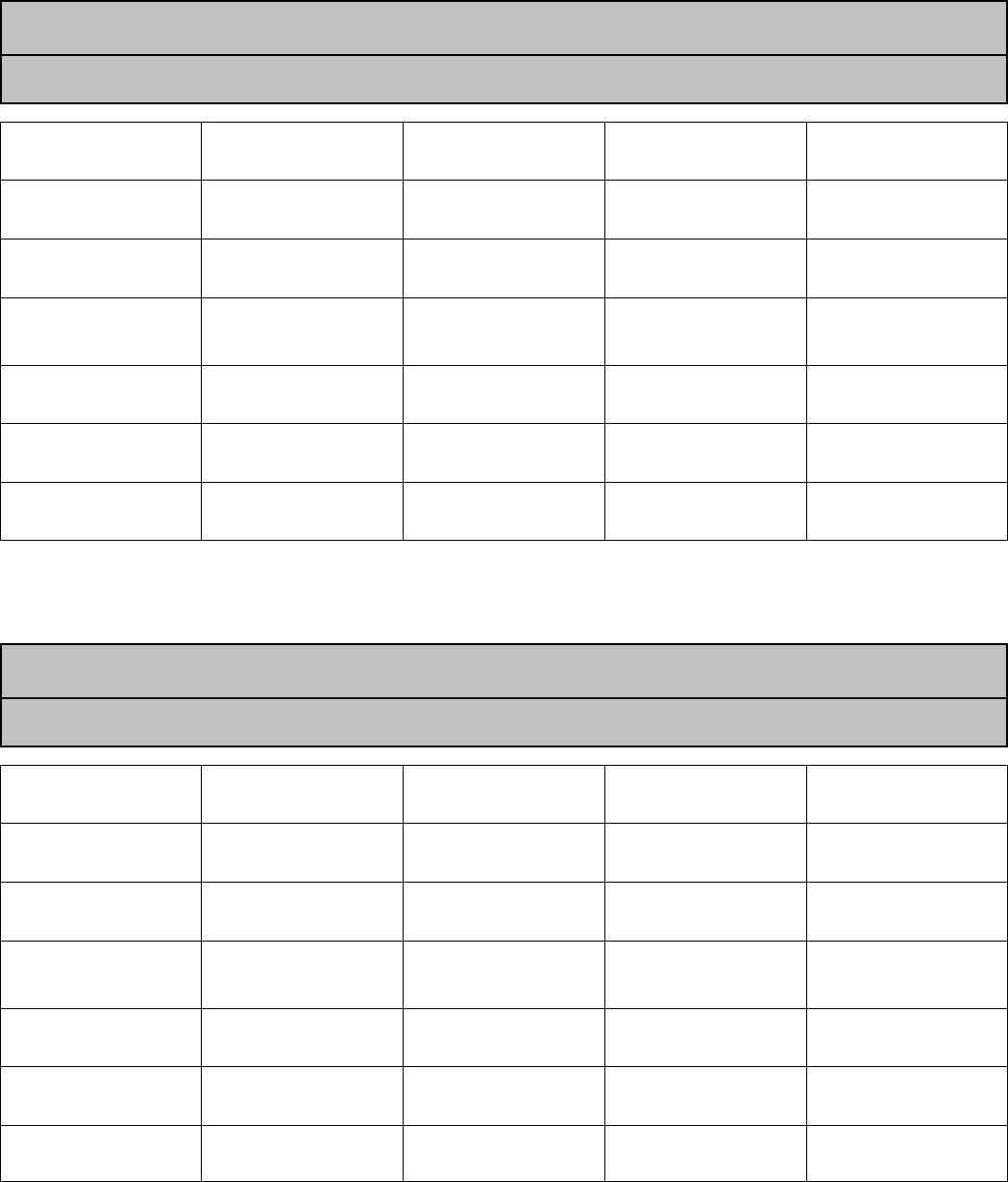
CLIENT’S TRUST ACCOUNT PROPERTY LEDGER
ADDRESS NAME
MEMO TERMS LIMIT ACCOUNT NO. SHEET
NAME
DATE ITEM DEBIT CREDIT BALANCE
CLIENT’S TRUST ACCOUNT PROPERTY LEDGER
ADDRESS NAME
MEMO TERMS LIMIT ACCOUNT NO. SHEET
NAME
DATE ITEM DEBIT CREDIT BALANCE
EXHIBIT #2
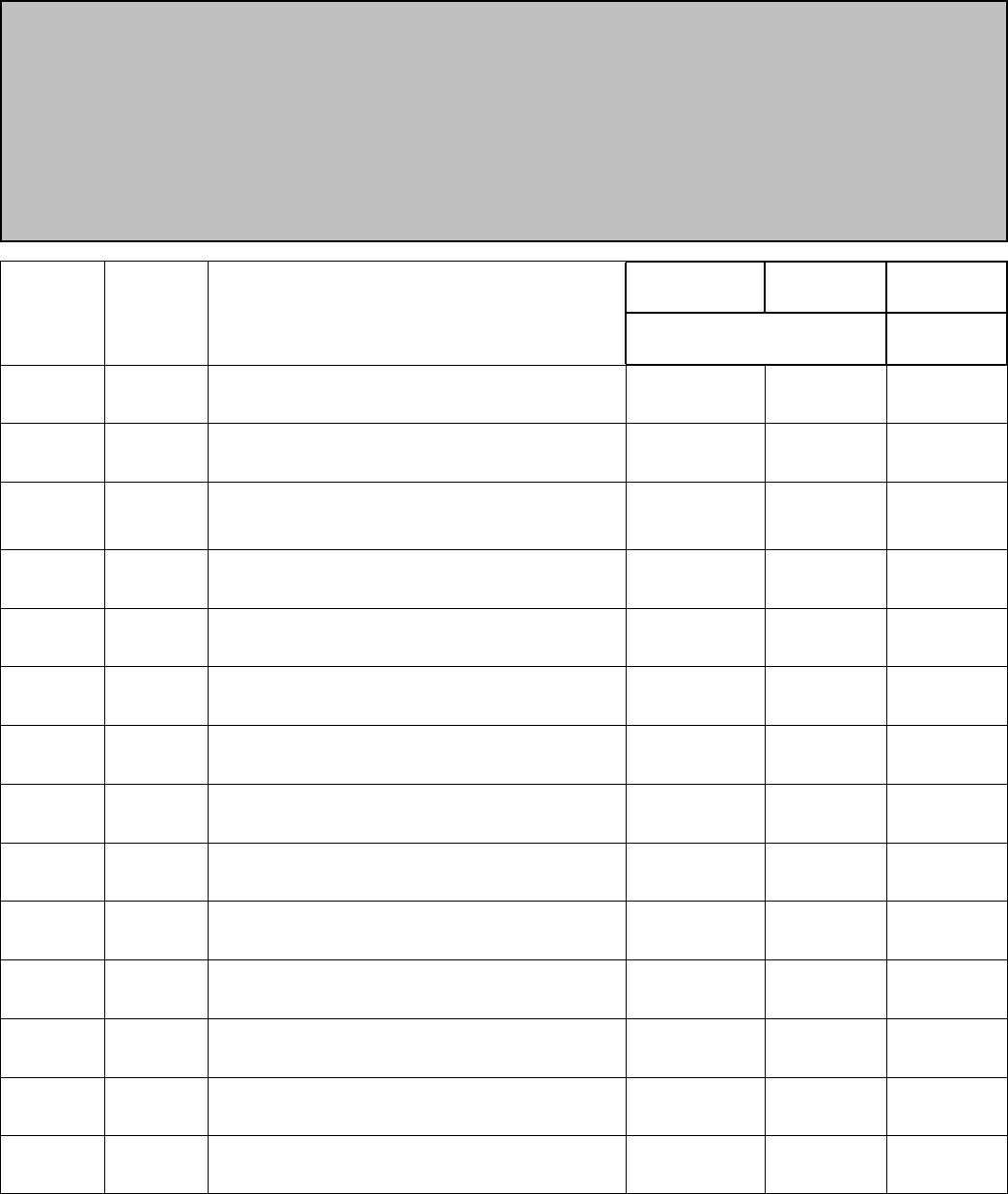
OWNER’S LEDGER CARD
OWNER’S LEDGER CARD
ACCOUNT NO. ____________________________________
OWNER NAME: ___________________________________________________________________________
PROPERTY ADDRESS: ______________________________________________________________________
OWNER ADDRESS: __________________________________________ PHONE NO. ___________________
DATE
YEAR
20____
CHECK
NO.
DESCRIPTION
PAYMENTS DEPOSITS BALANCE
BALANCE FORWARD
EXHIBIT #3
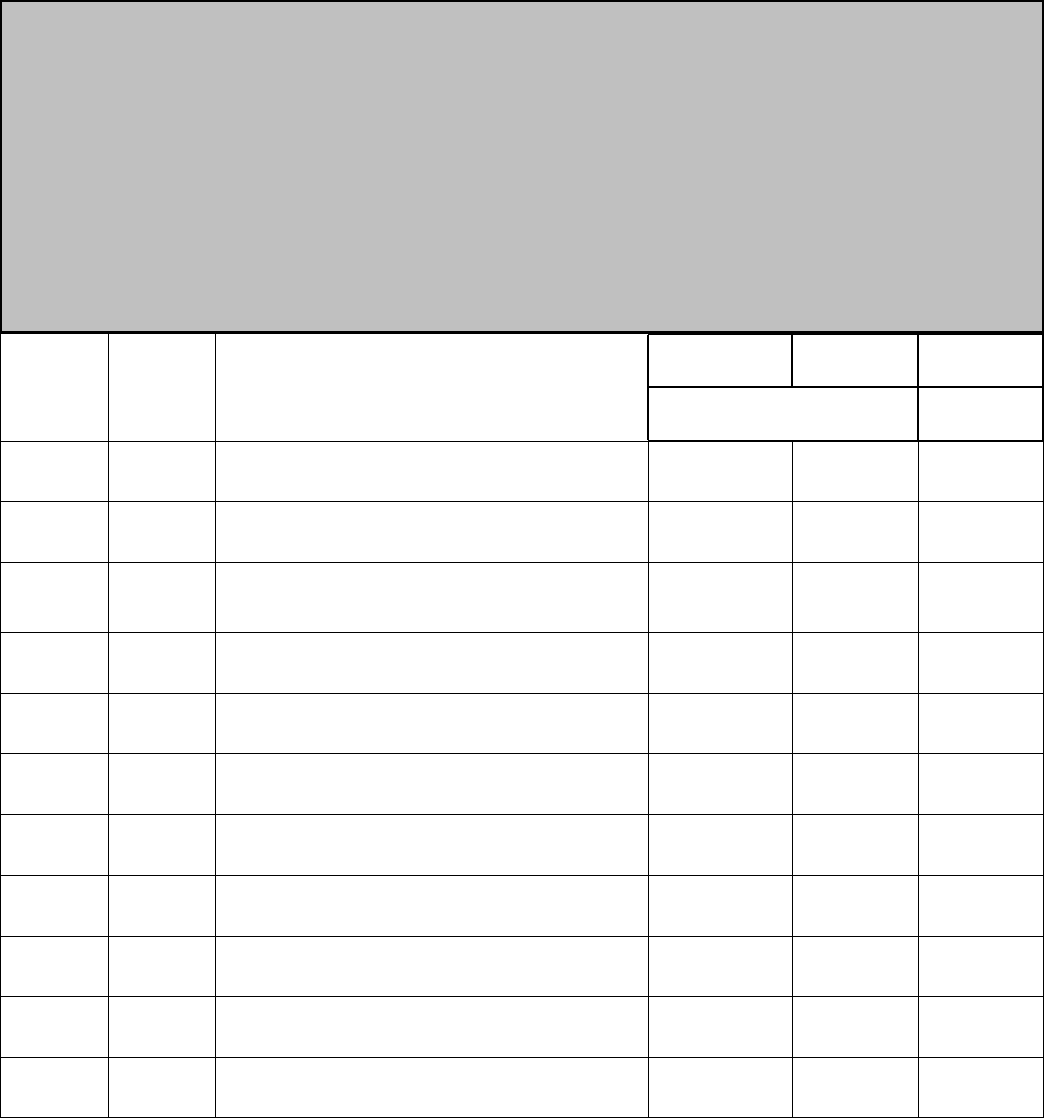
TENANT’S LEDGER CARD
DATE
YEAR
20____
CHECK
NO.
DESCRIPTION
PAYMENTS DEPOSITS BALANCE
BALANCE FORWARD
EXHIBIT #4
LEASE DATE: EXPIRATION: SEC DEP HELD BY: RENT DUE BY:
___________________ ___________________ ___________________ ___________________
TENANT LEDGER CARD
ACCOUNT OR CARD NO. ____________________________________
PROPERTY ADDRESS: ______________________________________________________________________
TENANT NAME: ___________________________________________________________________________
HOME PHONE: _____________________________ WORK PHONE: ________________________________

CASH RECEIPTS: $TOTAL
Beg cash balance
Gross Rental Income
Other Sources
Less Vacancy Allowance
TOTAL CASH RECEIPTS:
CASH DISBURSEMENTS:
Debt Service
Operating Expense Summary
Escrows for Taxes, Insurance, etc.
Other Expenditures
TOTAL CASH PAYMENTS:
EXCESS (DEFICIT) CASH RECEIPTS OVER PAYMENTS
(This is carried to beginning cash next month)
OWNER’S MONTHLY STATEMENT PAGE #: _______
FOR THE MONTH OF: _______________________ ACCOUNT NO. ___________________
PROPERTY ADDRESS: _________________________________ OWNER NAME:___________________
EXHIBIT #5
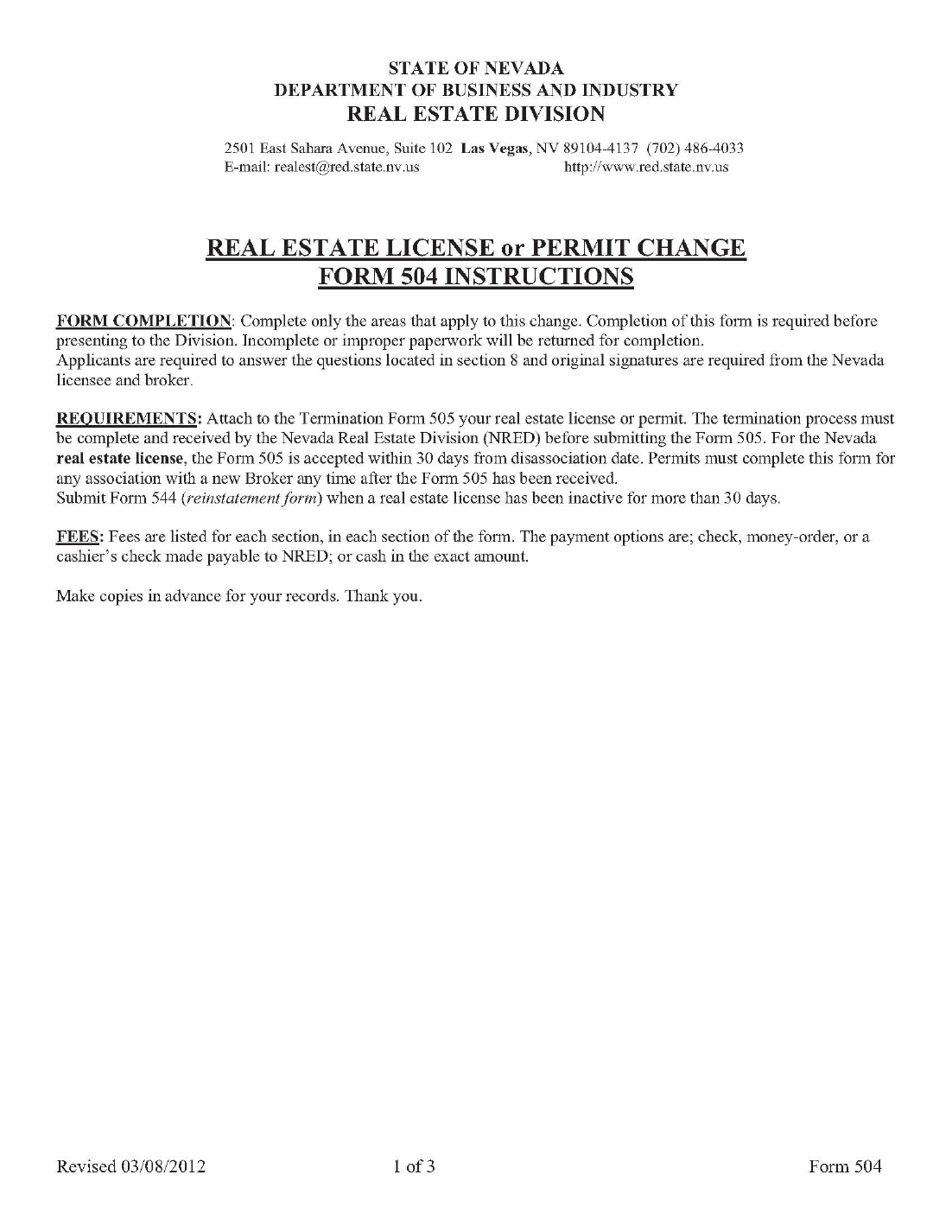
EXHIBIT #6
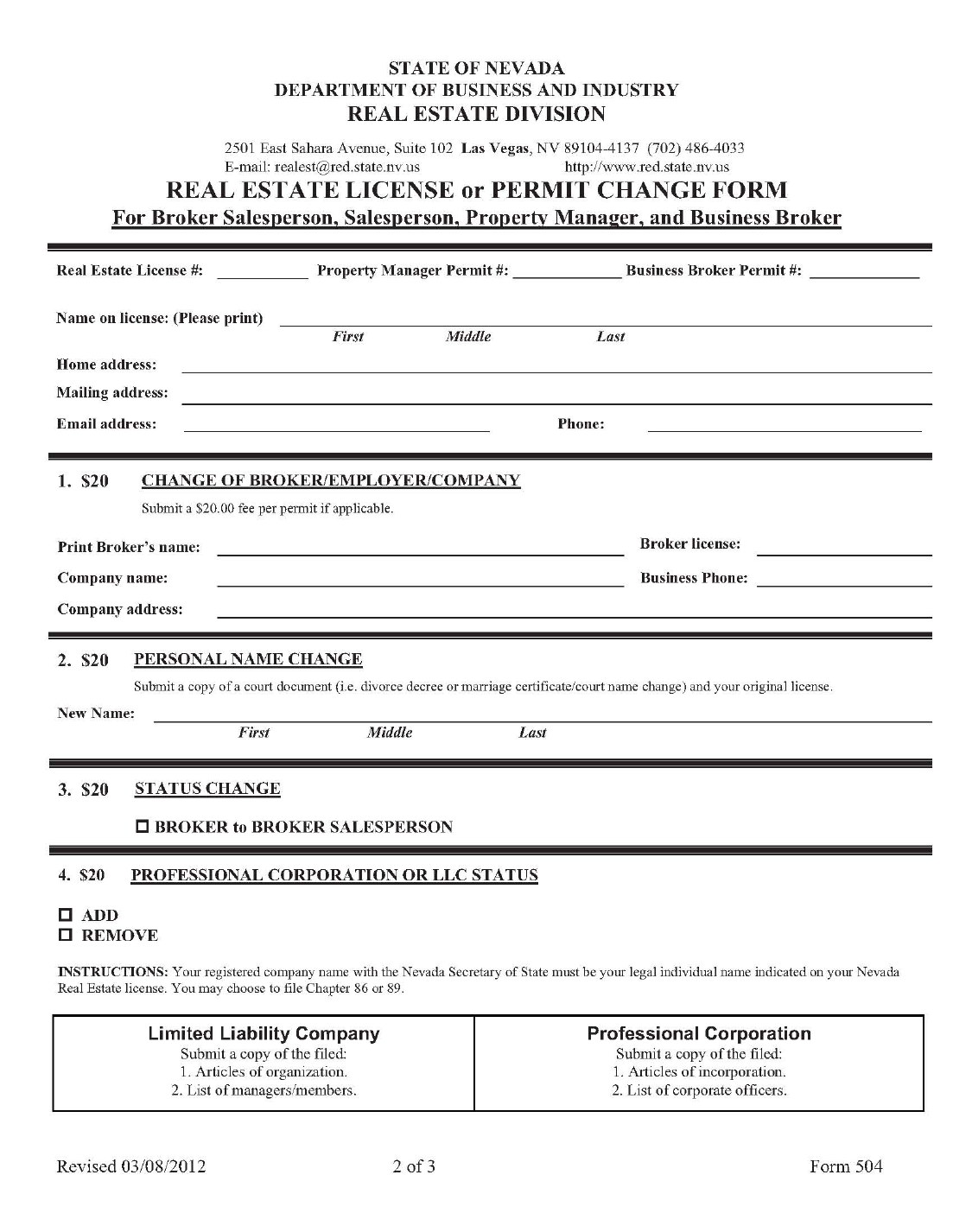
EXHIBIT #6
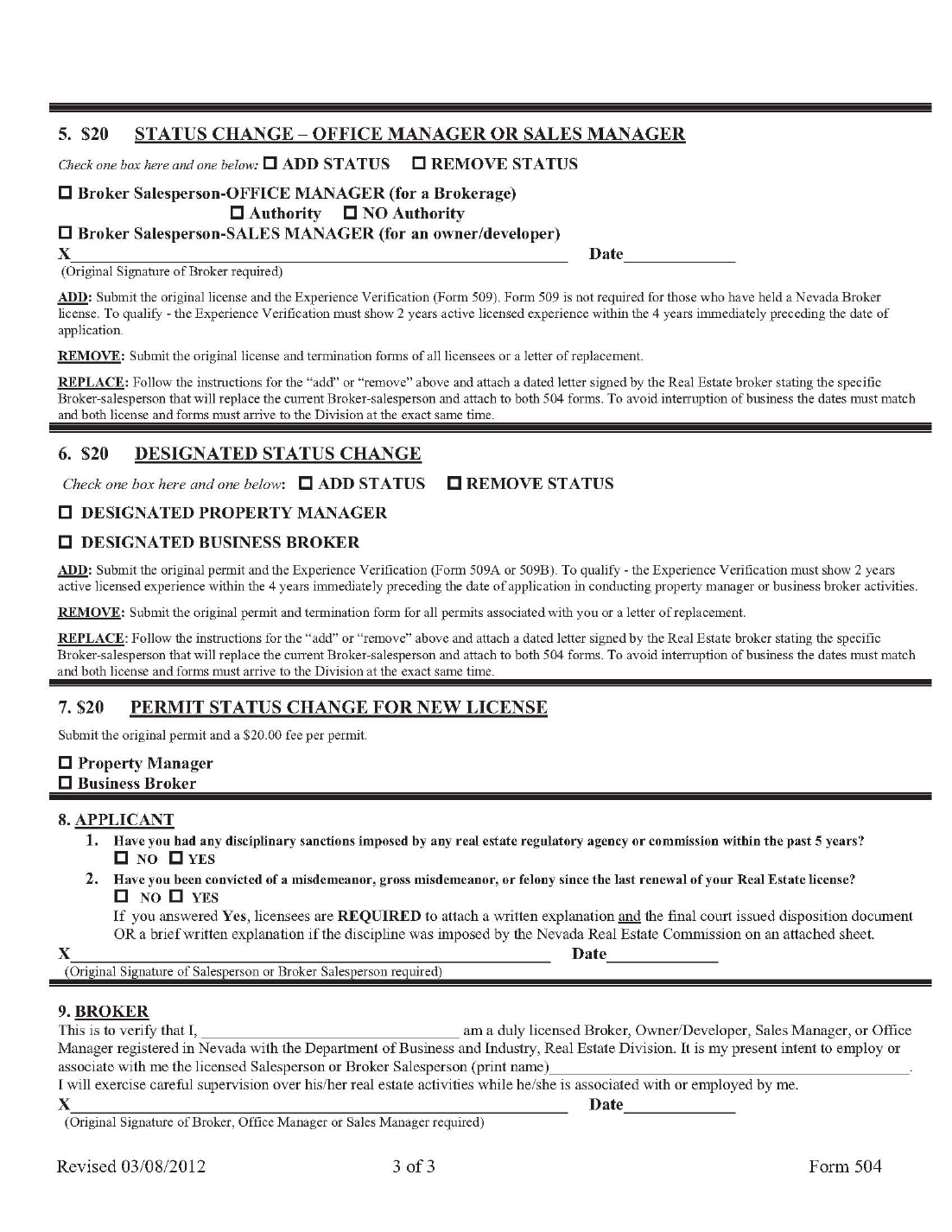
EXHIBIT #6
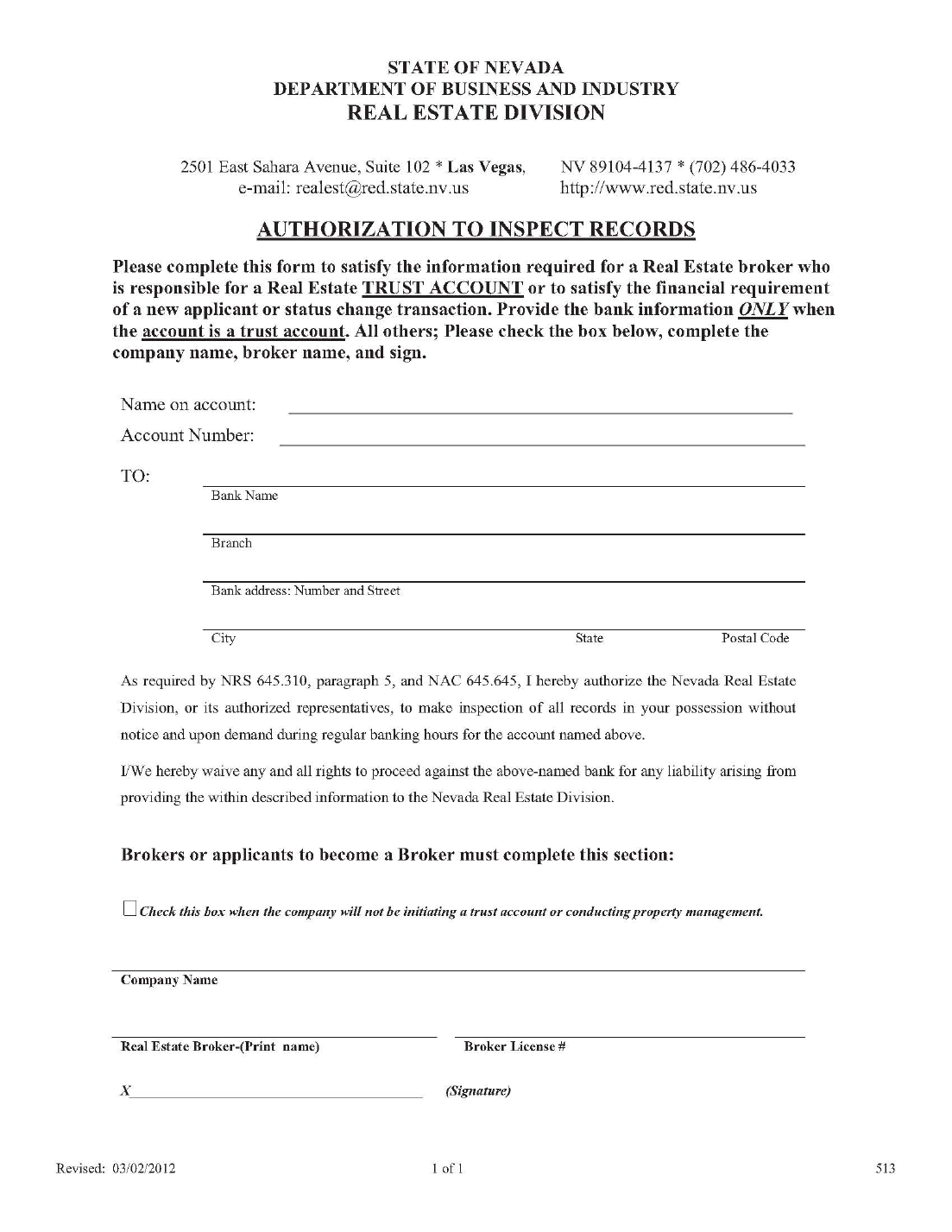
EXHIBIT #7

EXHIBIT #8
LOCATION OF RECORDS
Date:
TO THE REAL ESTATE DIVISION: Real Estate
Appraiser
,
hereby notify the Real Estate Division that my
(Name - Please Print)
records for the business known as
Business Name
will be kept at the following address:
Street
City State
Zip Code
I understand that I must give written notice to the Real Estate Division of the exact location of
these records if they should change.
Signature
Home Address
City State Zip Code
Home Telephone
Business Telephone
STATE OF NEVADA
DEPARTMENT OF BUSINESS AND INDUSTRY
REAL ESTATE DIVISION
788 Fairview Drive, Suite 200 * Carson City, NV 89701-5453 * (775) 687-4280
2501 East Sahara Avenue, Suite 102 * Las Vegas, NV 89104-4137 * (702) 486-4033
e-mail: [email protected] http://www.red.state.nv.us
Revised: 08/21/01 512
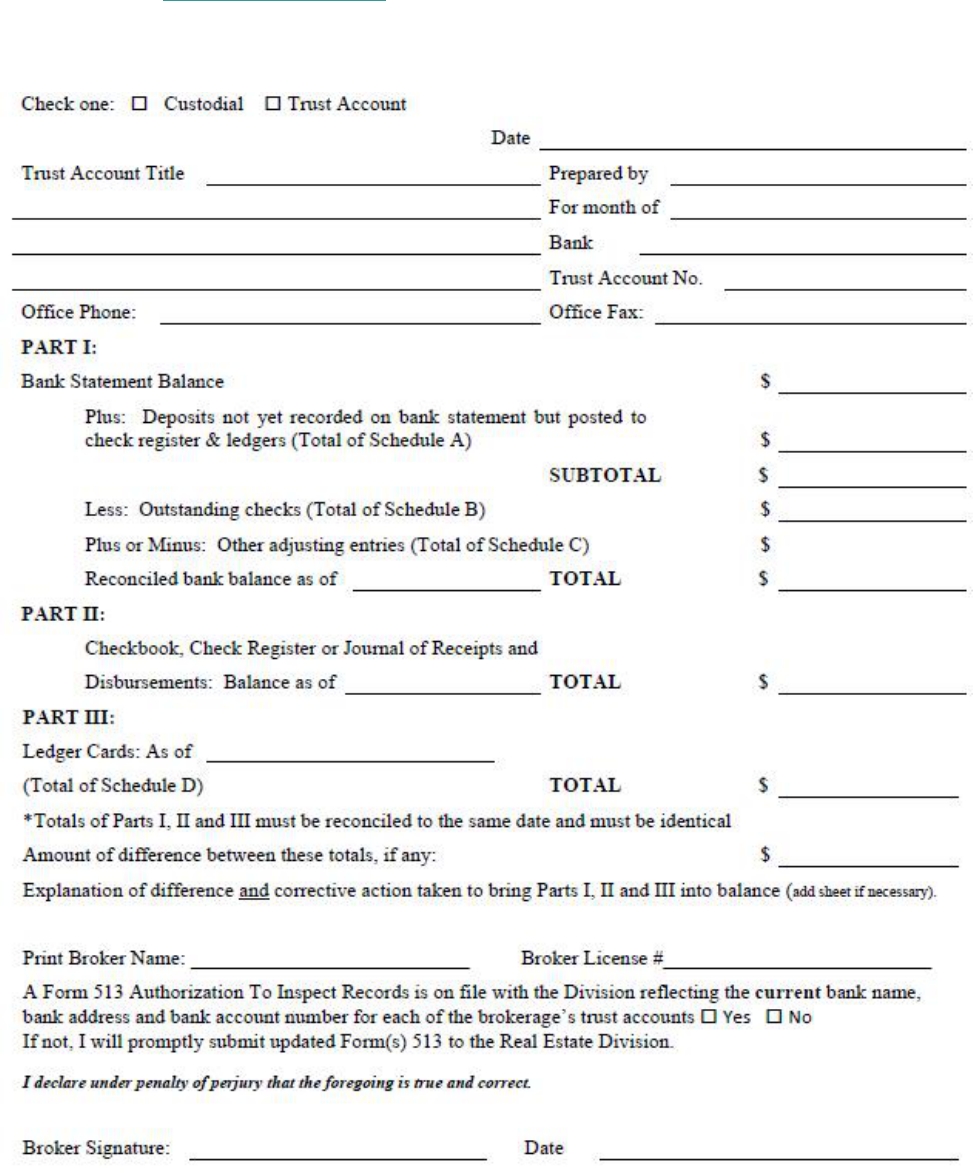
STATE OF NEVADA
DEPARTMENT OF BUSINESS AND INDUSTRY
REAL ESTATE DIVISION
2501 East Sahara Avenue, Suite 102 * Las Vegas, NV 89104-4137 * (702) 486-4033
e-mail: [email protected] http://www.red.state.nv.us
TRUST ACCOUNT RECONCILIATION
Revised 2/8/12 1/2 Form 546
EXHIBIT #9
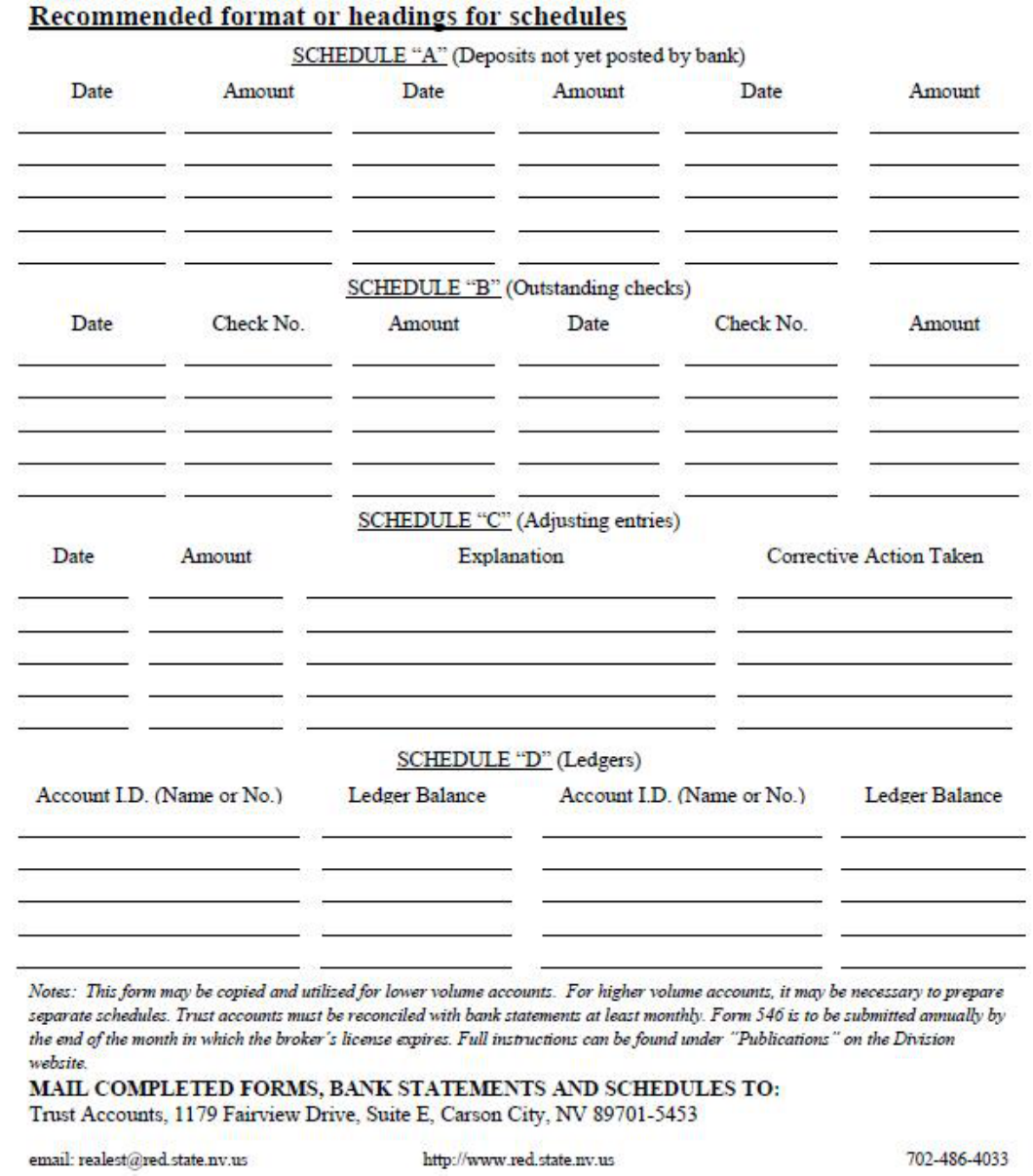
Revised 2/8/12 2/2 Form 546
EXHIBIT #9
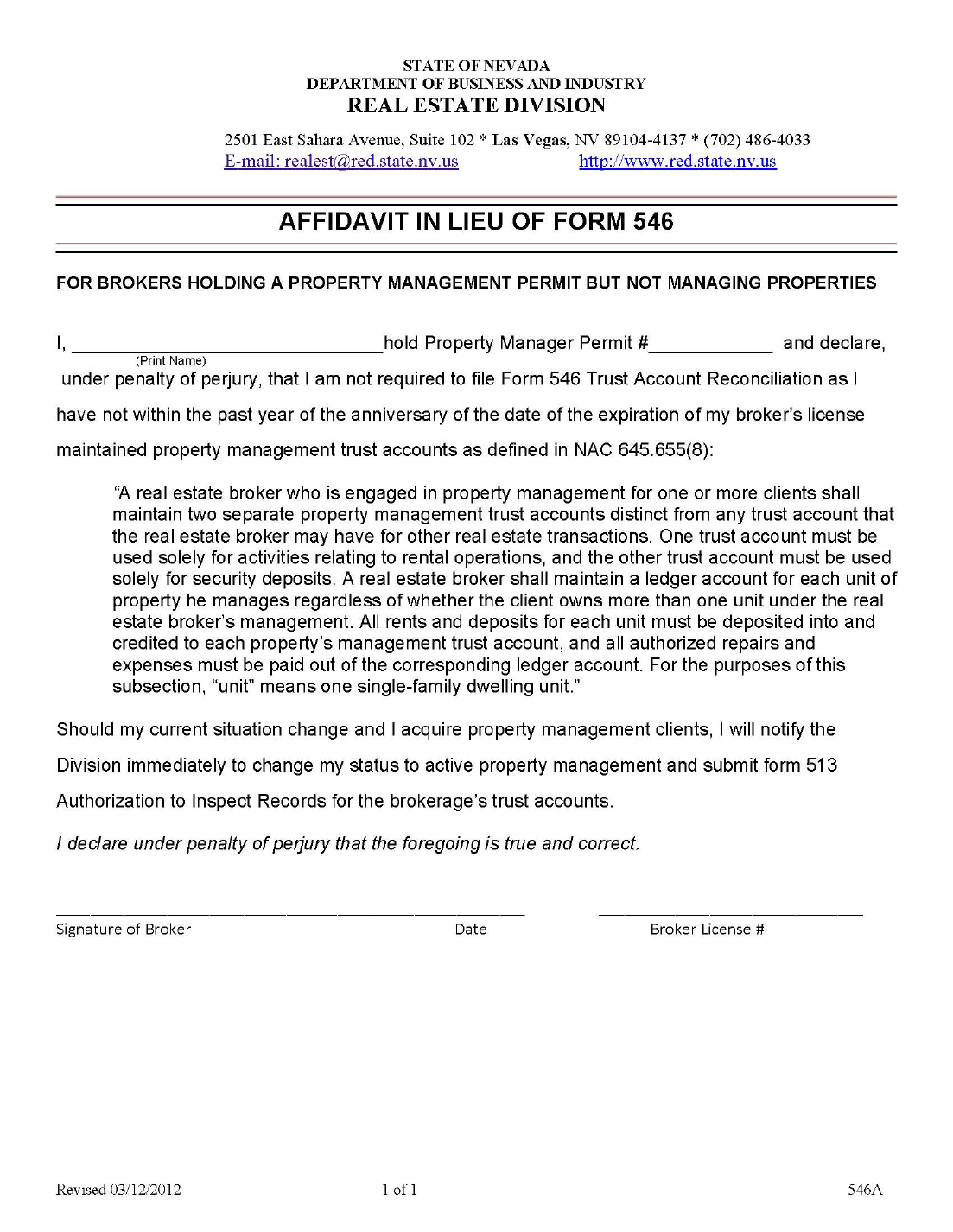
EXHIBIT #10
STATE OF NEVADA
DEPARTMENT OF BUSINESS & INDUSTRY
REAL ESTATE DIVISION
2501 E SAHARA AVENUE, SUITE 101
LAS VEGAS, NV 89104-4137
